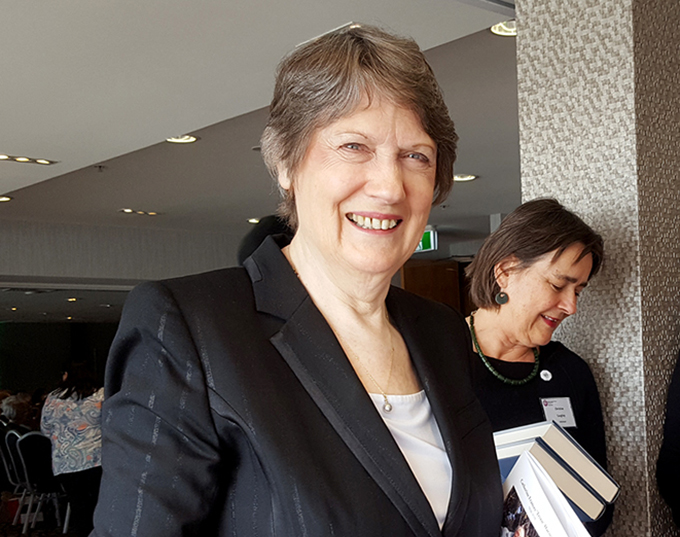
The major item on the agenda at last week’s Pacific Islands Forum was climate change. However, a gender gap appears to be at play within climate change itself. Jessica Marshall reports for Asia Pacific Journalism.
The content of the Boe Declaration, signed at the Pacific Islands Forum in Nauru earlier this month, is not widely known. However, a statement from NZ Prime Minister Jacinda Ardern suggests that it declares climate change as a security issue.
“The Boe Declaration acknowledges additional collective actions are required to address new and non-traditional challenges. Modern-day regional security challenges include climate change,” she said in a statement.
Both the leaders communique and the declaration itself affirm the fact that climate change is a real issue. However, it is discussion of gender in light of that is lacking.
READ MORE: Nauru 2018 and the new Boe on the block

According to a report by Oxfam, men survived women 3 to 1 in the 2004 Boxing Day tsunami.
The United Nations Development Programme (UNDP) suggests that this was because women were trapped in their homes at the time of the disaster “while men were out in the open”.
The agency also suggest that a cultural or religious custom can restrict a woman’s ability to survive a natural disaster.
“. . . the clothes they wear and/or their responsibilities in caring for children could hamper their mobility in times of emergency,” a UNDP report says.
Caregivers and providers
Figures from the United Nations show that 80 percent of those displaced by climate change were women. This, they argue, is caused primarily by their roles as caregivers and providers of food.
London School of Economics research indicates that women and girls are definitively more vulnerable to the effects of climate change than their male counterparts.
In societies where women are considered to be lower on the metaphorical food chain, “natural disasters will kill . . . more women than men,” the report says.
The two researchers could find no biological reason why women would be at more risk than men.
Based on this research, and other research like it, many public figures have called for attention to be paid to the issue.
“More extreme weather events. . . will all result in less food. Less food will mean that women and children get less,” dystopian author Margaret Atwood told a London conference in June.
The author of books like The Handmaid’s Tale and Oryx and Crake said that climate change “. . . will also mean social unrest, which can lead to wars and civil wars . . . Women do badly in wars”.
Primarily burdened
When asked about the issue at an event at Georgetown University in February, former US Secretary of State Hillary Clinton said that “. . . women. . . will be . . . primarily burdened with the problems of climate change”.
Earlier this month, former NZ Prime Minister Helen Clark told a crowd of about 200 people at the National Council of Women (NCW) conference that the world was close to missing the opportunity to tend to the issue of climate change and women were most likely to be affected by it.
“Everything we know tells us that women are the most vulnerable in this,” she said. “If you look at the natural disasters caused by weather. . . more women die”.
According to Marshall Islands President Hilda Heine, President of the Marshall Islands, women are more affected by climate change than their male counterparts but are also “less likely to be empowered to cope”.
“Women aren’t making enough of the decisions, and the decisions aren’t yet doing enough for women,” she wrote in The Guardian.
The UNDP argues it is because of a woman’s place in the household that she is in prime position to affect change when it comes to this issue.
“. . . knowledge and capabilities [regarding reproduction, household and community roles] can and should be deployed for/in climate change mitigation, disaster relief and adaptation strategies,” the report says..
Feminist solution
“A feminist solution” is what former Irish President and UN Rights Commissioner Mary Robinson argued for in June.
She explained that “feminism doesn’t mean excluding men, it’s about being more inclusive of women and – in this case – acknowledging the role they can play in tackling climate change”.
She’s not the only, nor the first, to make such a suggestion.
A whole feminist environmental movement, known as ecofeminism, has sprung up over the decades since the 1970s.
At its most basic level, ecofeminism is exactly what it sounds like: It argues that there is a relationship between environmental damage – such as that done by climate change – and the oppression of women and their rights.
For example, in her 2014 book This Changes Everything, journalist Naomi Klein argues that it is hypocritical that the self-same lawmakers who claim to be “pro-life” are also the ones who push for whole industries surrounding drilling, fracking and mining to not only survive but thrive.
Business confidence
“If the Earth is indeed our mother, then far from the bountiful goddess of mythology, she is a mother facing many great fertility challenges,” she writes.
In New Zealand, leader of the opposition National Party Simon Bridges, who is opposed to the idea of removing abortion from the Crimes Act, is also vehemently opposed to the idea of stopping oil and gas exploration in the Taranaki region.
His concern is that “It will have an effect on business confidence,” he said back in April.
The truth of climate change, as with most global issues, is that there can be no one-size fits all solution.
For some, like Helen Clark, it requires long-term mass movements. For others, it requires being invited to the conversation.
Time will tell as to which one wins out.















































